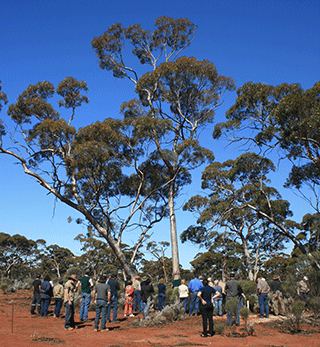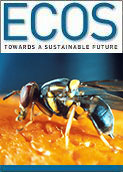
|
Published: 7 November 2013
Field research finds a home in the Great Western Woodlands
As the largest remaining intact temperate woodland in the world, Western Australia’s Great Western Woodlands is of international biological significance. Established in 2011 as a research ‘Supersite’ by the Terrestrial Ecosystems Research Network (TERN), the WA Department of Parks and Wildlife and CSIRO, the area now has its own field studies centre, occupying the old homestead at the former Credo pastoral lease.

|
|
The recent opening of the Credo Field Studies Centre. Credit: © WA Department of Parks and Wildlife
|
The Great Western Woodland is a 16 million hectare mosaic of eucalypt woodlands, shrublands, salt lake systems and mallee vegetation.
The woodland has remained relatively intact since European settlement, due to the lack of rainfall and lack of readily accessible groundwater means. Uniquely, this woodland ecosystem can survive on as little as 250 millimetres of annual rainfall.
Dr Suzanne Prober of CSIRO Ecosystem Sciences said the new centre would facilitate projects already underway at the TERN Supersite.
‘Our work at the Great Western Woodlands Supersite is helping us to understand how these magnificent woodlands work, and hence how they can best be managed and conserved in conjunction with other land uses’, she said.
The Credo Field Study Centre will be used by scientists associated with the Supersite and other projects, and also for meetings, conferences and training, Aboriginal joint management activities, environmental education and ecotourism.
The former Credo pastoral lease is also home to an ‘OzFlux’ climate station, which monitors the energy, water and carbon balance of the mature eucalypt woodland, and a series of long-term biological monitoring plots.
The Great Western Woodlands Supersite is part of an Australia-wide network of sites for monitoring the environment that are supported by TERN.
The Supersite aims to address significant land management issues relevant to agriculture, mining, pastoralism and biodiversity. It provides a unique opportunity to study how woodlands can adapt to climate change. As a unique, intact reference ecosystem, the woodlands also offer significant potential to inform climate-resilient restoration of the adjacent Western Australian wheat belt.
Source: CSIRO



